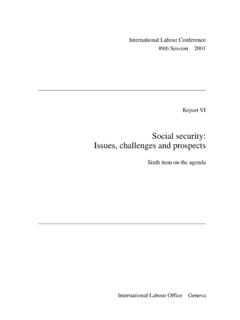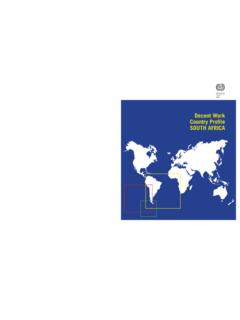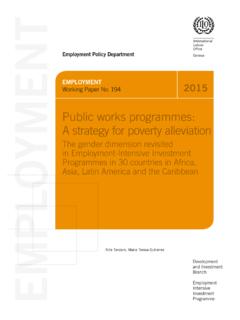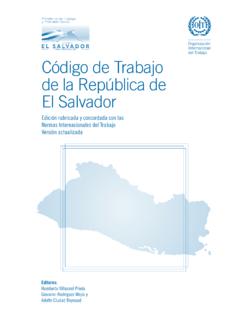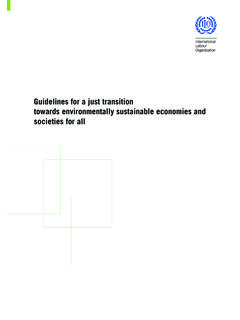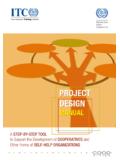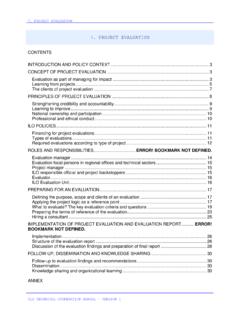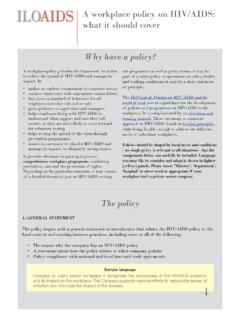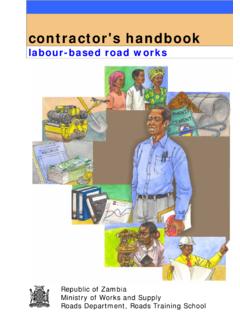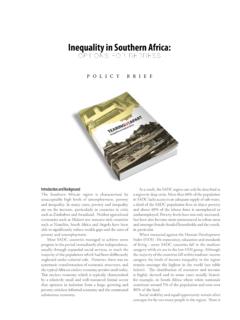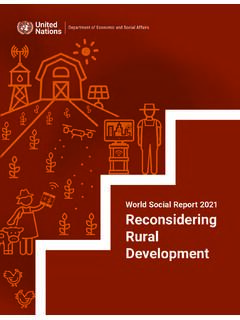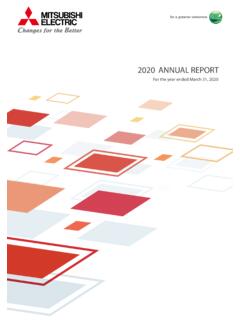Transcription of The future of work in the automotive industry: The need to ...
1 TMFWAI/2021 The future of work in theautomotive industry: The need to invest in people scapabilities and decentand sustainable workIssues paper for the Technical Meeting on the future of Work in the automotive Industry (Geneva, 15 19 February 2021) Sectoral Policies Department Geneva, 2020 Copyright International Labour Organization 2020 First edition 2020 Publications of the International Labour Office enjoy copyright under Protocol 2 of the Universal Copyright Convention. Nevertheless, short excerpts from them may be reproduced without authorization, on condition that the source is indicated. For rights of reproduction or translation, application should be made to ILO Publications (Rights and Licensing), International Labour Office, CH-1211 Geneva 22, Switzerland, or by email: The International Labour Office welcomes such applications. Libraries, institutions and other users registered with a reproduction rights organization may make copies in accordance with the licences issued to them for this purpose.
2 Visit to find the reproduction rights organization in your country. The future of work in the automotive industry: The need to invest in people s capabilities and decent and sustainable work, Issues paper for the Technical Meeting on the future of Work in the automotive Industry (Geneva, 15 19 February 2021), International Labour Office, Sectoral Policies Department, Geneva, ILO, 2020. ISBN 978-92-2-031863-8 (print) ISBN 978-92-2-031864-5 (Web pdf) Also available in French: L avenir du travail dans le secteur automobile: La n cessit d investir dans le potentiel humain et dans le travail d cent et durable, document d orientation pour la R union technique sur l avenir du travail dans le secteur automobile (Gen ve, 15-19 f vrier 2021), ISBN 978-92-2-032116-4 (print), ISBN 978-92-2-032117-1 (Web pdf), Geneva, 2020; and in Spanish: El futuro del trabajo en la industria automotriz y la necesidad de invertir en la capacidad de las personas y el trabajo decente y sostenible, documento tem tico para la Reuni n t cnica sobre el futuro del trabajo en la industria automotriz (Ginebra, 15-19 de febrero de 2021), ISBN 978-92-2-032118-8 (print), ISBN 978-92-2-032119-5 (Web pdf), Geneva, 2020.
3 ILO Cataloguing in Publication Data The designations employed in ILO publications, which are in conformity with United Nations practice, and the presentation of material therein do not imply the expression of any opinion whatsoever on the part of the International Labour Office concerning the legal status of any country, area or territory or of its authorities, or concerning the delimitation of its frontiers. The responsibility for opinions expressed in signed articles, studies and other contributions rests solely with their authors, and publication does not constitute an endorsement by the International Labour Office of the opinions expressed in them. Reference to names of firms and commercial products and processes does not imply their endorsement by the International Labour Office, and any failure to mention a particular firm, commercial product or process is not a sign of disapproval.
4 Information on ILO publications and digital products can be found at: Printed by the International Labour Office, Geneva, Switzerland iii Contents Page Background .. 1 1. The automotive industry .. 3 Definition and structure .. 4 Global motor vehicle production .. 6 Global motor vehicle sales .. 8 Contribution to Gross Domestic Product and world trade .. 11 Global 12 The automotive industry at a turning point .. 15 2. Megatrends and drivers of change .. 16 Technological advances .. 16 Advanced manufacturing .. 16 Digitalization in the automotive value chain .. 18 New products and materials .. 19 Globalization .. 21 Demographics .. 23 Climate change .. 25 3. Challenges and opportunities for decent and sustainable work .. 27 Employment .. 27 Job losses .. 28 Job transformation .. 29 Job creation .. 30 Skills and lifelong learning .. 33 future demand for skills.
5 33 The building blocks of skills development and lifelong learning .. 35 Gender equality at the heart of skills development .. 38 Coordinated policies and action for lifelong learning .. 39 Investing in lifelong learning .. 40 Social protection and conditions of work .. 42 Social protection .. 42 Changes in work organization .. 43 Working-time arrangements .. 44 Migrant workers .. 45 Occupational safety and health .. 47 Fundamental principles and rights at work .. 48 Social dialogue .. 49 1 Background At its 335th Session (March 2019), the Governing Body of the ILO decided to convene a technical meeting on the future of work in the automotive industry and the need to invest in people s capabilities and decent and sustainable work. 1 At its 337th Session (October November 2019), the Governing Body in turn decided that the technical meeting should take place in Geneva on 4 8 May 2020.
6 2 In the context of the ILO Centenary Declaration for the future of Work, 3 the meeting will discuss future needs for skills and vocational education and training in the automotive industry. With regard to the composition of the meeting, the Governing Body decided to invite all governments, eight Worker representatives and eight Employer representatives, appointed on the basis of nominations made by the respective groups of the Governing Body. Selected official international organizations and international non-governmental organizations were to be invited as observers. This issues paper has been prepared by the International Labour Office as a basis for discussions at the meeting. Chapter 1 contains a brief overview of the automotive industry today in terms of its structure; vehicle production and sales; and contribution to gross domestic product (GDP), world trade and employment.
7 Chapter 2 sets out the megatrends and drivers of change that will transform the industry in the future , with a focus on technological advances, globalization, demographics and climate change. Chapter 3 describes the challenges and opportunities for decent and sustainable work in terms of employment; skills and lifelong learning; social protection and conditions of work; fundamental principles and rights at work; and social dialogue. The issues paper addresses the challenges and opportunities that the automotive industry faces in the context of the Centenary Declaration, in which the Conference declared that, in further developing its human-centred approach to the future of work, the ILO must direct its efforts to: (i) ensuring a just transition to a future of work that contributes to sustainable development in its economic, social and environmental dimensions; (ii) harnessing the fullest potential of technological progress and productivity growth, including through social dialogue, to achieve decent work and sustainable development, which ensure dignity, self-fulfilment and a just sharing of the benefits for all.
8 (iii) promoting the acquisition of skills, competencies and qualifications for all workers throughout their working lives as a joint responsibility of governments and social partners in order to: 1 2 3 ILO, ILO Centenary Declaration for the future of Work, International Labour Conference, 108th Session (2019). 2 address existing and anticipated skills gaps; pay particular attention to ensuring that education and training systems are responsive to labour market needs, taking into account the evolution of work; and enhance workers capacity to make use of the opportunities available for decent work. 4 4 ILO, Centenary Declaration, para. (i) (iii). 3 1. The automotive industry 1. The automobile is one of the most successful manufactured products of the past century. It is perceived as a fast, comfortable, flexible and affordable mode of transport and has become a status symbol or means to reflect identity.
9 5 Automobiles are and will continue to be critical for the functioning of various industries, sectors, societies and economies worldwide. 6 2. The automotive industry is a major industrial and economic force in several economies. It originated in Germany and France, came of age in North America in the era of mass production and was further developed in Japan and the Republic of Korea. More recently, China has become a leader in the industry, particularly with regard to the production of electric vehicles (EVs). Vehicle volumes, features, choice, sales and trade and the contribution of the automotive industry to GDP have grown steadily throughout its history. It is so synonymous with twentieth century industrial development and so intertwined with mass production and mass consumption that it has been called the industry of industries . 7 3. The automotive industry makes a significant contribution to the global economy and to growth and development worldwide.
10 Its annual turnover is equivalent to the size of the sixth largest economy in the world. 8 The trade in motor vehicles reached US$ trillion in 2018, less than the trade in chemicals and various machinery but more than trade in communication products and in oil, gas and coal. 9 The industry is capital-intensive, drives innovation and generates billions of dollars in investment and millions of jobs and livelihoods. 4. At the same time, the use of automobiles is a major cause of local air pollution, greenhouse gas emissions and road accidents. Combined with the large environmental footprint of the automotive industry and concerns about working conditions in its supply chains, the industry is faced with increasing pressure to reduce its negative externalities and advance decent and sustainable work. 5. Because of its size and impact, the automotive industry is key to achieving the 2030 Agenda for Sustainable Development, in particular to achieving Goal 8 of the Sustainable Development Goal ( sdgs ), which aims to promote sustained, inclusive and sustainable economic growth, full and productive employment and decent work for all.
